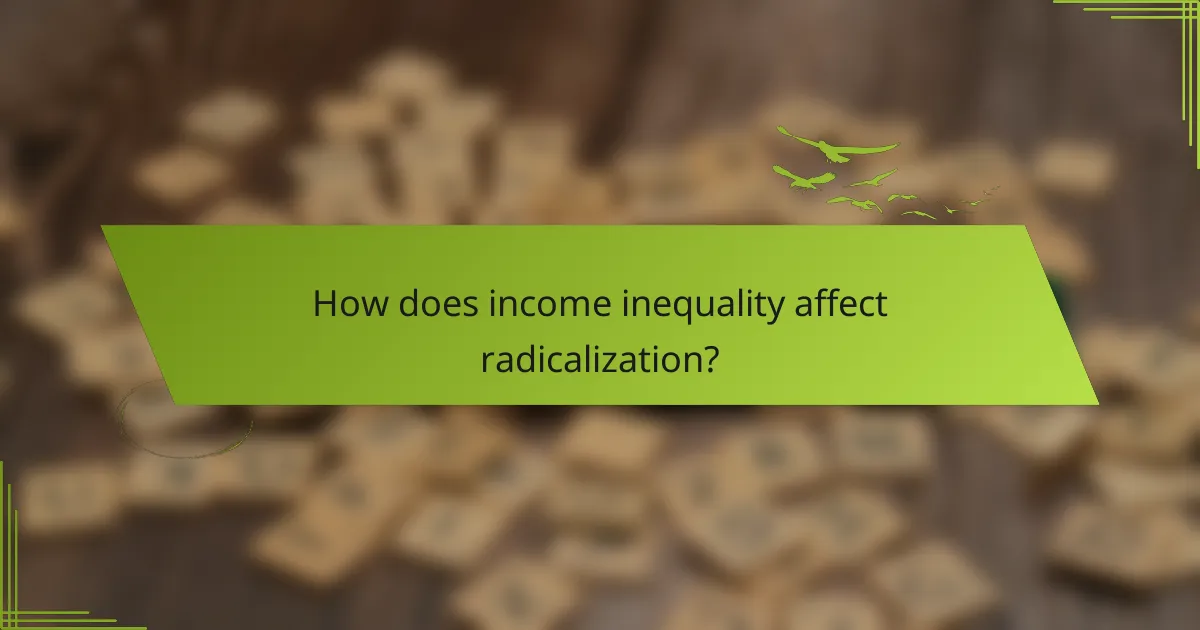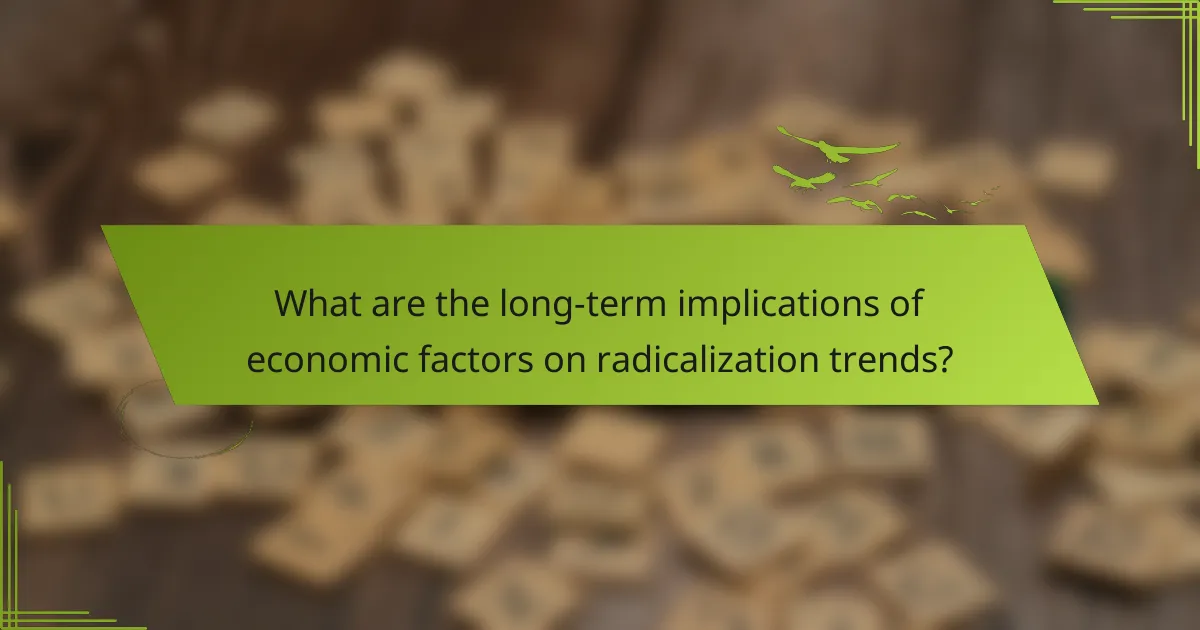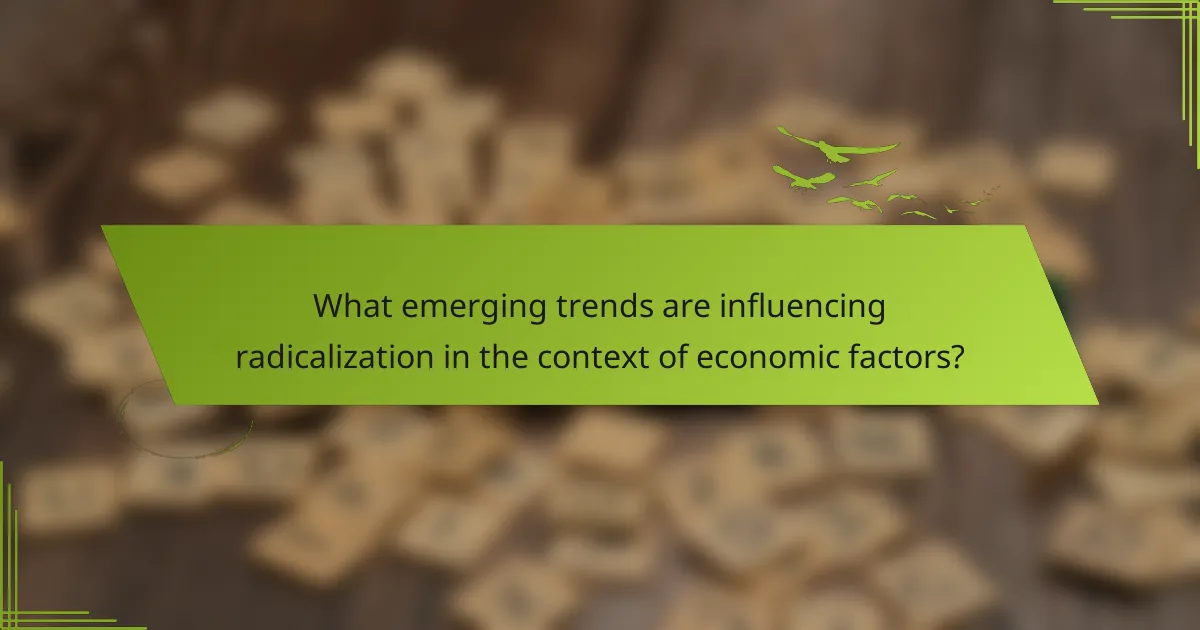The impact of economic factors on radicalization trends is profound, as they often create conditions that foster feelings of marginalization and disenfranchisement. Economic instability, high unemployment rates, and income inequality can lead individuals to seek solace in extremist ideologies, which may promise a sense of purpose and belonging in times of despair. Understanding these dynamics is crucial for addressing the root causes of radicalization and developing effective prevention strategies.

How do economic factors influence radicalization trends in the United States?
Economic factors significantly influence radicalization trends in the United States by creating environments where individuals may feel marginalized or disenfranchised. Economic instability, poverty, and job market fluctuations can lead to increased susceptibility to extremist ideologies.
Economic instability increases recruitment
Economic instability creates a fertile ground for recruitment into extremist groups. When individuals face uncertainty about their financial future, they may seek out belonging and purpose in radical organizations. This recruitment often targets those who feel abandoned by traditional societal structures.
For example, during economic downturns, such as the 2008 financial crisis, extremist groups have reported increases in membership as individuals look for solutions to their grievances. The promise of community and support can be particularly appealing in these times.
Poverty correlates with extremist behavior
Poverty is closely linked to extremist behavior, as individuals in economically disadvantaged situations may resort to radical ideologies as a means of expressing their frustrations. Limited access to education and job opportunities can exacerbate feelings of hopelessness, making extremist narratives more attractive.
Research indicates that regions with higher poverty rates often see a rise in radicalization cases. For instance, areas with unemployment rates above the national average may experience increased recruitment efforts from extremist groups targeting vulnerable populations.
Job market fluctuations affect radicalization
Fluctuations in the job market can directly impact radicalization trends. When job opportunities are scarce, individuals may feel disillusioned and turn to extremist ideologies as a form of protest or escape. Economic downturns often lead to increased competition for limited jobs, heightening tensions within communities.
Moreover, individuals who lose their jobs may struggle with identity and purpose, making them more susceptible to radicalization. Programs aimed at job creation and workforce development can be effective in mitigating these risks by providing individuals with stable employment and a sense of belonging.

What role does unemployment play in radicalization?
Unemployment significantly contributes to radicalization by fostering feelings of hopelessness and disenfranchisement among individuals. When people are unable to find work, they may become more susceptible to extremist ideologies that promise purpose and belonging.
High unemployment rates lead to disenfranchisement
High unemployment rates often result in widespread disenfranchisement, particularly among youth and marginalized communities. This sense of exclusion can lead to frustration and anger, making individuals more vulnerable to radical ideas.
For example, in regions with unemployment rates exceeding 15%, studies have shown a correlation with increased recruitment into extremist movements. The lack of economic opportunities can create a fertile ground for disillusionment and a search for alternative identities.
Unemployment as a recruitment tool for extremist groups
Extremist groups frequently exploit high unemployment as a recruitment tool, targeting individuals who feel lost and abandoned. These groups often offer financial incentives, social support, and a sense of community, which can be appealing to those struggling to find their place in society.
In many cases, recruitment strategies include promises of training and employment within the organization, which can be particularly enticing in areas with limited job prospects. By framing their ideology as a solution to economic despair, these groups can effectively draw in vulnerable individuals.

How does income inequality affect radicalization?
Income inequality significantly contributes to radicalization by creating feelings of disenfranchisement among marginalized groups. When wealth is concentrated in the hands of a few, it can lead to social tensions and a search for alternative ideologies that promise change or empowerment.
Income disparity fuels social unrest
Income disparity often leads to social unrest as those at the lower end of the economic spectrum feel excluded from opportunities and resources. This sense of injustice can manifest in protests, riots, or other forms of civil disobedience, which may attract individuals to radical groups that promise to address their grievances.
For example, in countries with high income inequality, such as Brazil or South Africa, there have been notable instances of violent protests driven by economic frustrations. These events highlight how economic disparities can ignite broader societal conflicts.
Wealth gaps increase susceptibility to extremist ideologies
Wealth gaps create an environment where individuals may turn to extremist ideologies as a means of coping with their economic situation. When people perceive that traditional avenues for improvement are blocked, they may seek out radical solutions that promise swift change.
In regions with significant economic divides, such as parts of the Middle East or Southeast Asia, extremist groups often exploit these vulnerabilities by offering a sense of belonging and purpose. This can lead to increased recruitment for radical movements, as individuals feel that their economic plight is being addressed through ideological means.

What are the psychological impacts of economic stress on radicalization?
Economic stress significantly affects psychological well-being, often leading individuals to seek radical ideologies as a coping mechanism. This stress can create feelings of insecurity and disenfranchisement, which may push some towards extremist beliefs.
Economic stress leads to identity crises
When individuals face economic hardship, they may experience an identity crisis, questioning their self-worth and societal role. This crisis can stem from job loss, financial instability, or lack of opportunities, leading to a sense of alienation.
As people struggle to define themselves in a challenging economic environment, they may turn to radical groups that provide a sense of belonging and purpose. These groups often exploit identity crises, offering a clear narrative that resonates with those feeling lost.
Frustration and hopelessness drive individuals towards extremism
Frustration from unmet economic expectations can lead to hopelessness, making radical ideologies appear as viable solutions. Individuals may feel that traditional avenues for success are blocked, prompting them to seek alternatives that promise change.
This sense of hopelessness can be exacerbated by social isolation and lack of support systems, further increasing vulnerability to extremist recruitment. Communities experiencing high unemployment or economic decline are particularly susceptible to these dynamics.

How do government policies impact economic factors related to radicalization?
Government policies significantly influence economic factors that can either foster or mitigate radicalization. By shaping social welfare, employment opportunities, and economic stability, these policies can directly affect individuals’ susceptibility to extremist ideologies.
Welfare policies can mitigate radicalization risks
Welfare policies play a crucial role in reducing radicalization risks by providing financial support and social services to vulnerable populations. When individuals have access to basic needs such as healthcare, education, and housing, they are less likely to feel marginalized or disenfranchised, which can reduce the appeal of extremist groups.
For example, countries with robust welfare systems often report lower rates of radicalization, as citizens feel a sense of belonging and support from their government. Effective welfare programs can include unemployment benefits, food assistance, and mental health services, all of which contribute to social stability.
Economic stimulus programs reduce extremist recruitment
Economic stimulus programs can effectively reduce extremist recruitment by creating jobs and fostering economic growth. When governments invest in infrastructure, education, and job training, they provide individuals with viable pathways to success, diminishing the allure of radical ideologies.
For instance, targeted initiatives that focus on high-unemployment areas can lead to significant reductions in recruitment by offering young people alternatives to joining extremist groups. Programs that emphasize skill development and entrepreneurship can empower communities and build resilience against radicalization.

What are the long-term implications of economic factors on radicalization trends?
Long-term economic factors significantly influence radicalization trends by creating environments where individuals feel marginalized and disenfranchised. Economic instability, high unemployment rates, and lack of opportunities can foster feelings of hopelessness, making radical ideologies more appealing.
Persistent economic issues may lead to increased radicalization
When economic challenges persist, such as prolonged unemployment or stagnant wages, communities may experience heightened frustration and disillusionment. This can lead to a search for alternative narratives, including radical ideologies that promise change or empowerment.
For instance, regions with high youth unemployment often see a rise in radicalization, as young people may feel they have little to lose. In such cases, the allure of extremist groups can become more pronounced, as these groups may offer a sense of belonging or purpose.
Future economic policies must address root causes
To mitigate radicalization, future economic policies should focus on addressing the underlying issues that contribute to disenfranchisement. This includes creating job opportunities, investing in education, and fostering inclusive economic growth that benefits all segments of society.
Policymakers should consider targeted initiatives, such as vocational training programs and community development projects, to engage at-risk populations. By improving economic conditions, the likelihood of individuals turning to radical ideologies can be significantly reduced, fostering a more stable and cohesive society.

What emerging trends are influencing radicalization in the context of economic factors?
Economic factors significantly shape radicalization trends by creating environments where individuals may feel marginalized or disenfranchised. Issues such as unemployment, income inequality, and economic instability can drive individuals toward extremist ideologies as they seek solutions to their grievances.
Digital economy impacts recruitment strategies
The rise of the digital economy has transformed recruitment strategies for extremist groups. Online platforms allow these organizations to reach a broader audience, targeting vulnerable individuals who may be struggling economically or socially.
Social media and encrypted messaging apps are commonly used to disseminate propaganda and foster community among potential recruits. This digital outreach is often tailored to appeal to specific demographics, utilizing data analytics to identify and engage with individuals who exhibit signs of discontent or isolation.
For example, extremist groups may leverage targeted ads or viral content that resonates with economic frustrations, making their messaging more effective. Understanding these digital recruitment tactics is crucial for countering radicalization efforts.
